

6 min read
This article is more than 7 years old
Explainer
Australia’s sea border with Timor: UN treaty has uncertain future as gas dispute rolls on
Australia has finally agreed on a permanent maritime border with Timor-Leste, but ongoing tension over the $40-billion Greater Sunrise gas field could still threaten the diplomatic agreement.
Published
Updated
By Hannah Belcher, James Elton-Pym
Image: East Timorese minister Agio Pereira and Australian foreign minister Julie Bishop sign the treaty at the United Nations headquarters. (AAP)
Australia and Timor-Leste have signed a historic treaty at the United Nations defining a permanent sea border between the two nations in line with international maritime law, ending a decades-long dispute.
But the treaty has not yet been ratified, and the future of a lucrative gas and oil deposit deep beneath the Timor Sea remains unclear, and a point of ongoing disputation.
Deal for now, but tensions remain
The treaty, signed at the United Nations headquarters in New York this week, has been hailed as a “new chapter” in Australian-Timor relations by Australian foreign minister Julie Bishop.
But there are already signs of diplomatic tensions.
The new sea border should settle some conflicts over resources – the reserves on the Timorese side will now be 100 percent owned by Timor-Leste.
But there is still disagreement over how to share revenue from the lucrative Greater Sunrise oil and gas field in the Timor Sea. The field was discovered in 1974 and is estimated to hold 5.1 trillion cubic feet of gas and 226 million barrels of condensates, which analysts have valued between $40 and $50 billion.
The treaty allows for two possible deals.
Australia has offered to share profits with an 80-20 percent split in Timor-Leste's favour, but with oil and gas processed in Darwin.
Timor-Leste wants a 70-30 percent split but with processing done in its own country to encourage the growth of a domestic processing industry, which would create much-needed jobs. Fifteen years after gaining independence, the tiny south-east Asian nation is still grappling with high unemployment, especially among its youth population.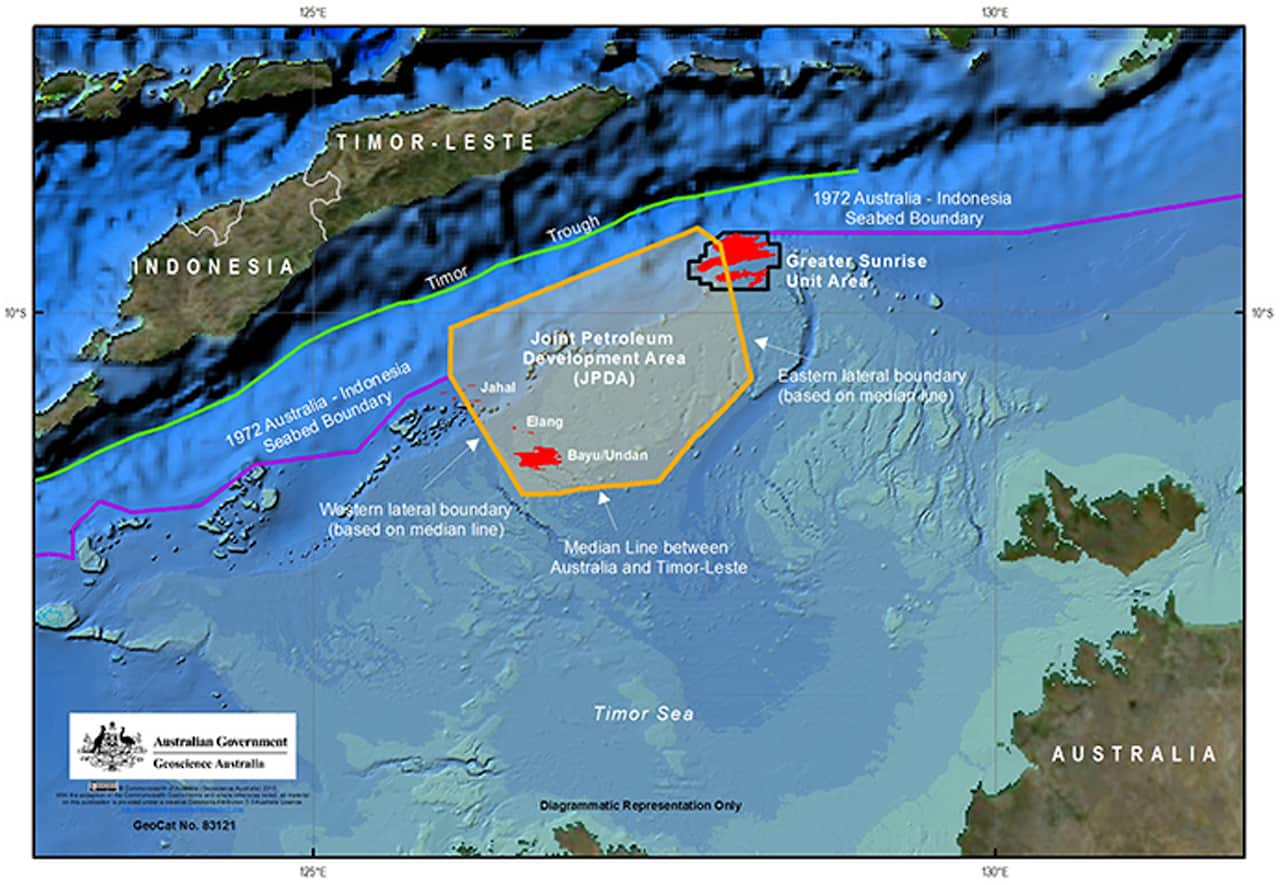 Don Rothwell, an expert in international maritime law at the Australian National University, told SBS News the opportunity for a gas processing industry was “worth more to Timor than to Australia.”
Don Rothwell, an expert in international maritime law at the Australian National University, told SBS News the opportunity for a gas processing industry was “worth more to Timor than to Australia.”

Undated map shows Australia's maritime arrangements with Timor-Leste and the Greater Sunrise gas field. Source: Department of Foreign Affairs and Trade
RELATED READING
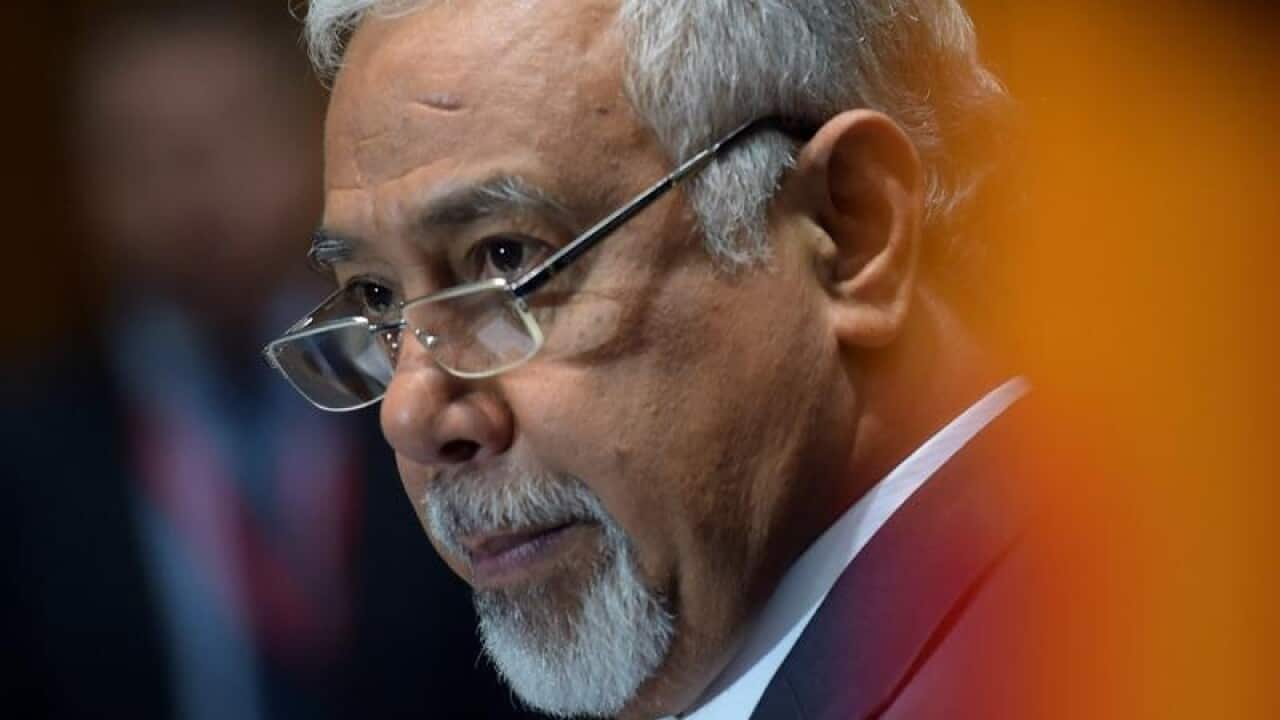
Aust colluded with oil firms: East Timor
Timor-Leste's deputy minister for the Delimitation of Borders Agio Pereira signed the treaty alongside Ms Bishop in New York and hailed it a "momentous day" that would be "recorded in Timor-Leste's history."
But Mr Pereira also described the negotiations over the gas field as "tough," admitting that "they were not mean to be easy."
"It's a conciliation process, it was never meant to be easy. We had ups and downs in this 22, 23 months," he said.
Mr Pereira confirmed, albeit in an optimistic tone, that the negotiations would be ongoing.
"We look forward to continuing the important discussions."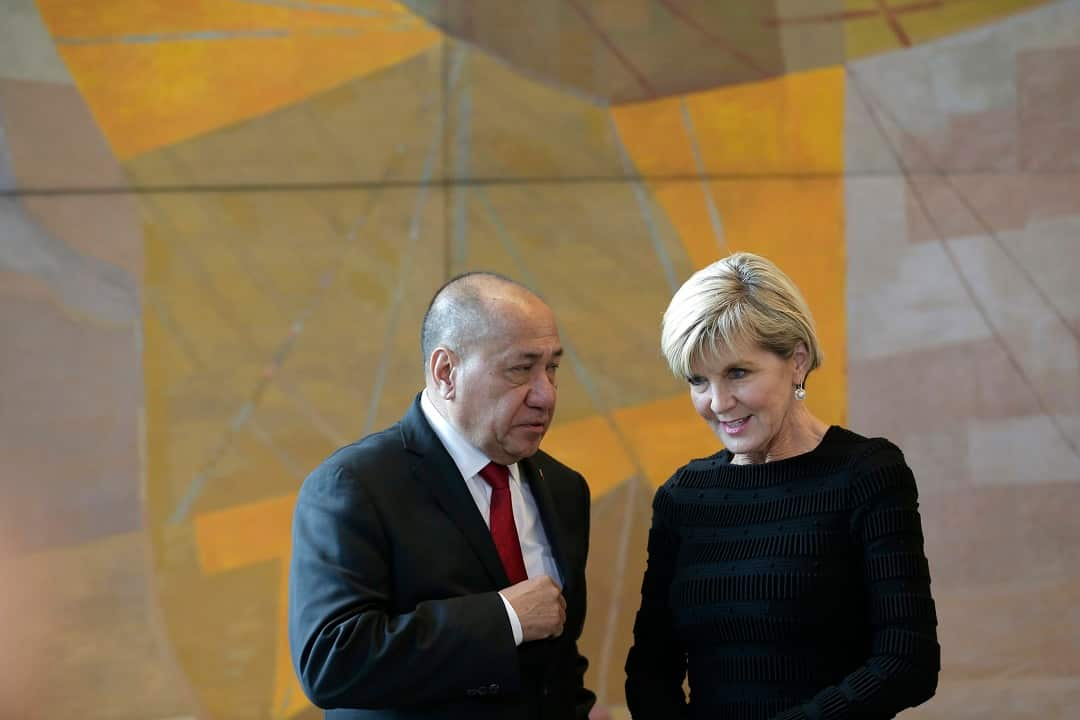

Australia's Julie Bishop and Timor-Leste's Agio Pereira have signed a treaty at the United Nations defining a new maritime border between the two nations. Source: AAP
Darwin vs Timor – who decides?
The decision over whether to take the gas to Darwin or Dili for refinement now rests with a group of four large resources companies.
Australian oil and gas company Woodside leads a joint venture with Conoco Phillips, Shell and Japan's Osaka Gas.
The involvement of the companies, which were invited to contribute to the United Nations conciliation process, has been controversial.
On the eve of the treaty being signed, Timor-Leste's chief negotiator Xanana Gusmao accused Australia of colluding with the corporates and blasted the UN for a “lack of impartiality.”
Professor Rothwell said the companies “really favour Darwin for a number of reasons,” but no final decision has been made.
However, Ms Bishop told reporters in New York that "Australia rejects absolutely any suggestion that we have acted other than in utmost good faith throughout this conciliation process."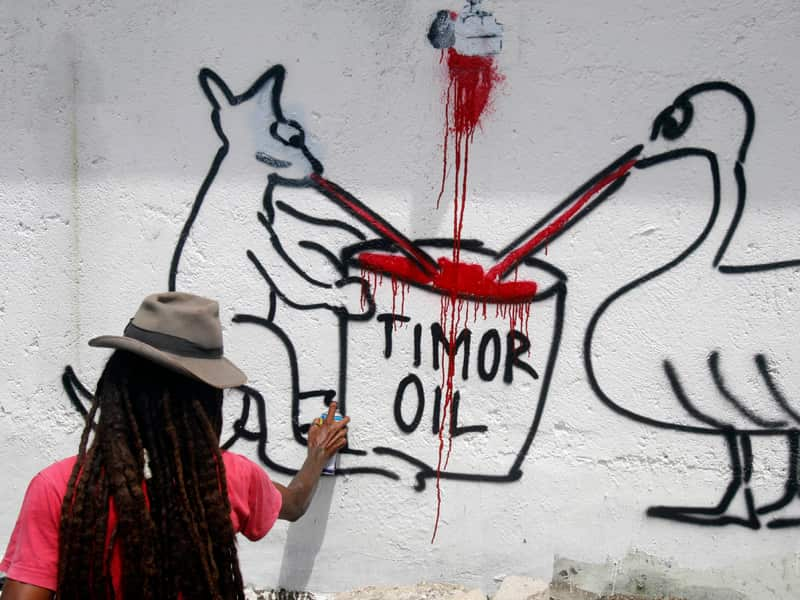

Timor-Leste accused Australia of spying during 2004 negotiations over the Timor Sea gas treaty. Source: AAP
Bad deal for Timor-Leste?
The fact the Greater Sunrise liquid natural gas field issue has not been resolved should be of great concern to Dili according to Professor Damien Kingsbury, deputy chair of Balibo House Trust - a non-governmental organisation that runs support programs in Timor-Leste.
“That’s really the core of the issue, that’s what this was all about,” he told SBS News. “Timor-Leste was hoping that by getting a medium line in the Timor Sea that they would then also get access to Greater Sunrise - that has not happened.”
Professor Kingsbury has accused Australia of being a "bully" in the long-running dispute and looking after "Australia's interests first."
“Australia’s behaviour in this whole saga has been fairly reprehensible I would say. It certainly has been a bully, especially in the initial negotiations in 2002 and 2006," he told SBS News.
"Whilst we thought we were seeing an improvement in that behaviour with the resolution of the maritime boundary issue, it seems that the position of Australia is continuing to push over the development of Greater Sunrise really just perpetuate its bullying position in relation to Timor-Leste, and in relation to resources which properly belong to Timor-Leste."
But after signing the treaty in New York, Ms Bishop did signal Australia's desire to share the resource with Timor-Leste.
"The treaty is an important step that opens the way for developing a rich, shared resource, the Greater Sunrise gas fields," she said.
"The way is now clear for Timor-Leste, as the majority beneficiary of the division of the resource, to find a way with the joint venture partners to develop Greater Sunrise in an economically viable fashion," she said.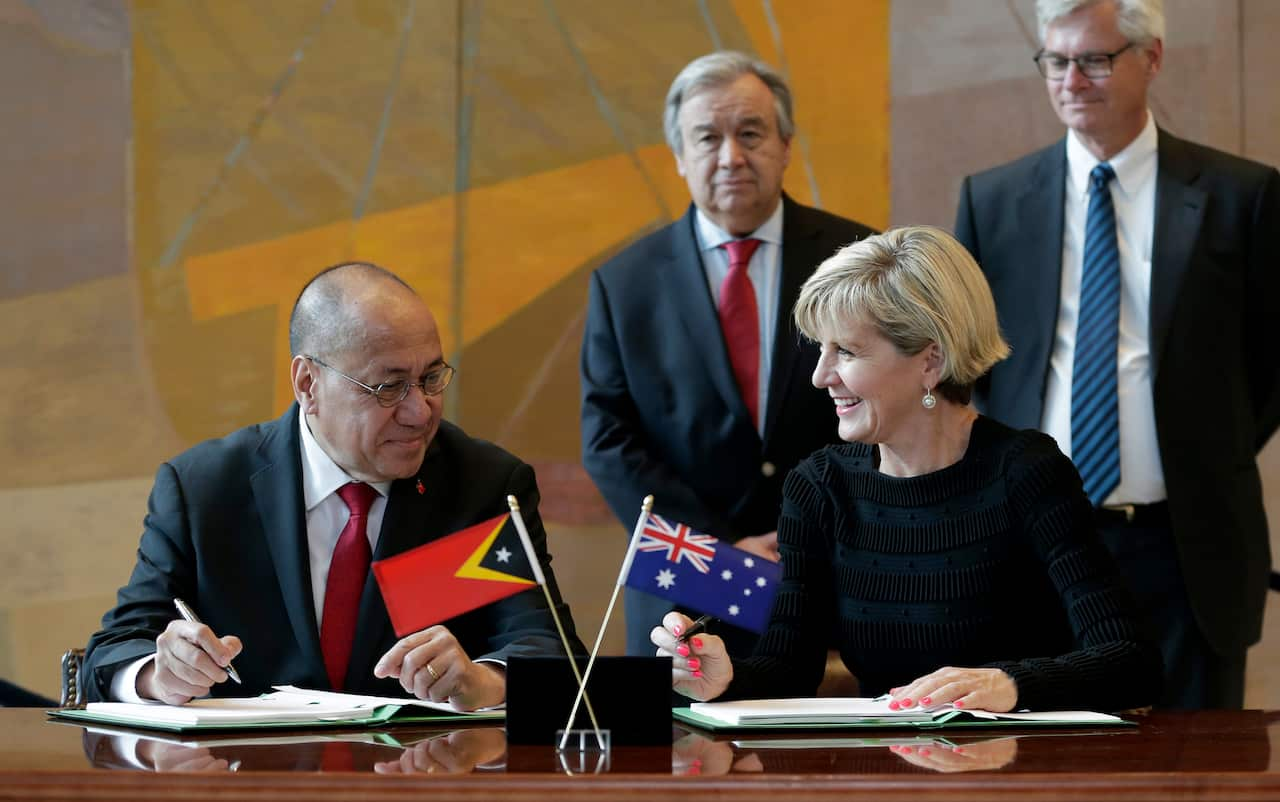

Timor-Leste's border minister Agio Pereira and Australian foreign minister Julie Bishop sign historic maritime border treaty at the United Nations. Source: AP Seth Wenig
Could Timor still tear up the deal?
Yes, it could.
The treaty has been signed but not ratified, meaning the Timorese have not passed a law to bring the agreement into effect.
The decades of often sour disagreement over the sea border have damaged the diplomatic relationship.
Timor-Leste took Australia to an international court over allegations of spying in 2005 and has accused its much larger neighbour of bullying tactics, forcing it to accept poor conditions after independence.
Then in 2016, Dili took the maritime border dispute to the Permanent Court of Arbitration (PCA) at The Hague. The international court ordered compulsory arbitration between the two parties - a process that led to this week's treating signing.
Adding further uncertainty, the Timorese will soon head to the polls for an election.
Professor Rothwell said there was still a “prospect” of Timor-Leste deciding to torpedo the deal if the gas ends up destined for Darwin.
“One prospect is that Timor says, ‘look, we’re not going to ratify the treaty, we don’t think it’s a good deal’, and they seek to renegotiate the aspects that they’re unhappy with,” he said.
He said it was still "early days" for the agreement.
"We'll wait and see how it develops over the next few months."
Listen to our podcasts
An overview of the day's top stories from SBS News
Interviews and feature reports from SBS News
Your daily ten minute finance and business news wrap with SBS Finance Editor Ricardo Gonçalves.
A daily five minute news wrap for English learners and people with disability
Get the latest with our News podcasts on your favourite podcast apps.
Watch on SBS

SBS World News
Take a global view with Australia's most comprehensive world news service
Watch the latest news videos from Australia and across the world